Ending The Great Gas Versus Diesel Debate - Fuel Efficiency in the Name of Diesel
Pass Gas, Burn Diesel
|
|
||||||||
|
Let's face it: Gas is good. A quick snap of the throttle generally renders sharp response and some excellent acceleration. Big horsepower is a beautiful thing, but it comes at a grave cost to those owners who have to grin and bare gigantic gas prices and frequent stops at the fueling station. In recent weeks, as oil prices have risen, that quick snap to the throttle has resulted in a bite at the gas guzzler's pocketbook that has sent some back to the dealership for a diesel. Right now, gasoline prices tower over the diesel per-gallon prices by well-over 20 cents in some cases. But that's not the only reason why truck owners are swapping in their less-efficient V10 gas guzzlers. Take ORC reader "Amo" for example, who is passing the gas and now on a mission to make good on his investment. Heartaches at half the mileage "Unfortunately, I can't make it very far without hitting the gas station. I'm only getting about 8 miles per gallon at times," says Amo, as he eyeballs the big 2001 Ford Super Duty that's powered by the massive V10 gas motor. "I think I'm looking to trade it in for a diesel. I should have got one to begin with." Weighing all the options, I took to burning dinosaur bones. Currently, the Mighty Power Stroke in my driveway gets an average of 19 MPG on the highway. The long bed, crew cab Ford Super Duty F-350 is powered by the V8 Power Stroke Diesel. It now rolls on 315 BFGoodrich Mud-Terrain KMs (stock size is 275) and stands about four inches over stock height. I'm keeping it as low and as I can get away with for aerodynamics and stability. Stock 3.73 gearing resides in the pumpkins, which for the tire size, renders great fuel economy. A testament to this statement was a recent trip to California, when the Power Stroke nailed 17.5 MPG, driving at a steady 80 MPH and hauling a light 1,400 pound load. On the return trip, we flat-towed a Jeep that weighed in at about 4,600 pounds, fully loaded. With the same 1,400 pound payload in the truck bed, a moderate headwind and a 20-minute traffic delay south of Barstow, we nailed 14.8 MPG. Not bad. Two out of three Super Duty There's no doubt why two out of three Ford F-Series Super Duty owners choose the Power Stroke Diesel. Why? Well, their gas guzzling counterparts pump more fuel per mile than a diesel does, because common knowledge dictates that diesel gets an average of 40 to 60 percent better fuel economy over gas. Despite a more expensive purchase price at the showroom floor, diesel owners understand substantial savings are in store for them. In fact, it can take as few as a year or two to see an return on the initial diesel investment, depending of course on fuel prices, driving conditions and your particular biased mathematical calculations. This is because diesel is a far more efficient power plant, providing increased durability, longevity, fuel economy and maintenance costs over that of a gas motor. As for the break-even cost analysis of a diesel versus a gas motor, try working a diesel to death with extreme payloads and torturous conditions. It'll respond with continued service, whereas the gas will up and die long before hand. To further the diesel argument, keep in mind that the resale value is more than enough reason to purchase one to begin with. When it comes right down to dollars and cents investments, the gas, on the other hand, just ain't go enough gas to give you the bang for the buck that you'll see in the long runs. Almost everywhere you want to be Sure, diesel fuel is not as prevalent at "fuel"stations here in the states, but it is there, and, right now, it is cheaper. Right now at the pump, per gallon prices for diesel fuel is easily 20 cents cheaper than the lowest-grade gasoline prices. In Europe, where gas prices are upwards of three to four bucks a gallon, diesel motors are prevalent, powerful and efficient. For example, there are diesel-powered cars being produced that can reach 130 MPH and still achieve up to 60 MPG. Volkswagen manufactures a diesel car that boasts a whopping 100 MPG.
Could it get any cheaper? Of course it can! Try off-road diesel that sales for more than 40 cents cheaper. Why is it cheaper? Well, because it's off-road diesel, it is not charged state and federal highway taxes. For those of you who are thinking of running off-road diesel on the highway, consider that it can spell hefty fine, which in Nevada ranges from a $1,000 or $10 per gallon of fuel tank capacity, whichever is greater. Law enforcement does keep an eye out for violators, but it mainly targets commercial big rigs who are stopped for inspections. When it comes to increasing your miles per gallon with diesel, generally, additives just don't cut the cake. In order to improve fuel economy, an additive must cause the engine fuel to burn more thoroughly, and with diesel, there just isn't a lot of room for improvement. According to Chevron website, diesel burns up to a 98 percent efficiency rate and produces 40 percent less CO2 emissions than gasoline engines. Because diesel fuel is denser, at 20% power output, diesel motors consume about 35% less fuel than a gas motor does. At 100% power output, the diesel achieves about 85% efficiency.
Safety Factor What about safety? Well, you're in the right rig when you're in a diesel. Living around orange groves, I've been known to sit beside a smudge pot filled with diesel and dip matches in it. Try that with gas, and you'll get an explosion hotter than hell, which is why the United States Military chooses diesel over gasoline motors for its forces kicking ass in Iraq. Because a diesel is a more efficient power plant, they run cooler than gas. This adds to the motor's legendary longevity, which commonly translates into a life span that exceeds 500,000 miles before an overhaul. After that many miles, imagine the savings in maintenance and fuel. Running cool under pressure How about towing 12,000 pounds of trailer up steep mountainous grades between Southern California to Las Vegas, Nevada in the blistering summer heat? Here, temperatures are known soar to over 120 degrees. First do the legendary Baker Grade behind the wheel of a gas motor with a heavy load 12,000 pound load at your heels. First, you watch the temperature gauge fire off like a rocket toward the sky. You shutdown the air conditioner to the evil sneer of the wife sitting in a pool of sweet beside you. Regardless of your meager efforts, the gauge goes further toward meltdown mode. Meanwhile, even at a slower rate of speed, where you're lucky to get 8 MPG, your valves begin knocking on heaven's door and you pray that the pistons don't go. You're in a gas guzzler and the diesels are passing you with their windows up, air conditioning on, smiles on their faces and on a smooth road to the river with the water toys in tow.
Buy as much truck as you can afford; buy a diesel.
http://www.chevron.com/prodserv/fuels/bulletin/diesel/L2_2_4_fs.htm |
||||||||

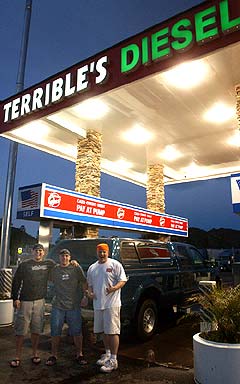
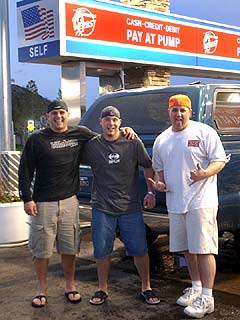
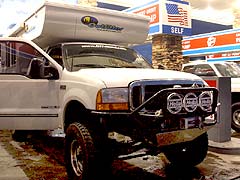
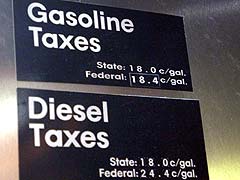
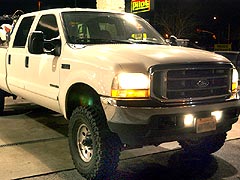

 Your Privacy Choices
Your Privacy Choices